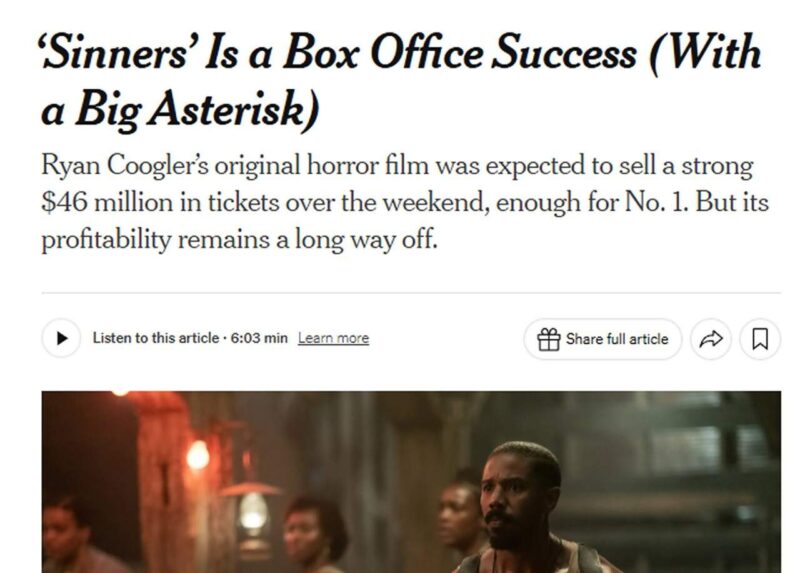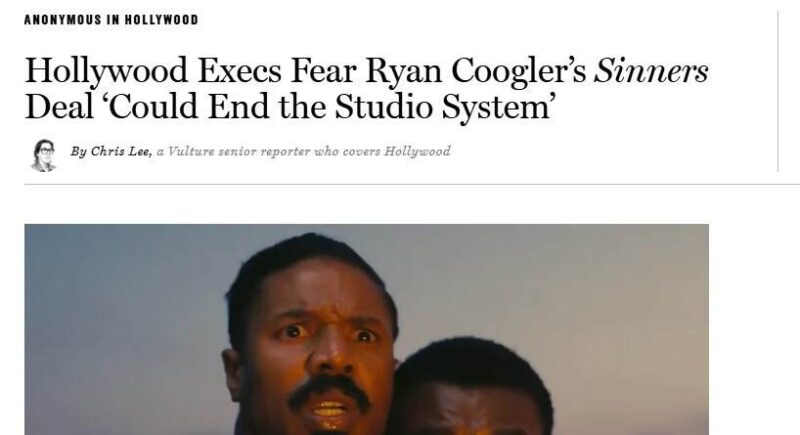
Ryan Coogler’s Sinners hits big at the box office, but reporting of its success is coming with no shortage of qualifiers. Some thoughts.
The success of Ryan Coogler’s latest movie Sinners over the weekend is something very, very worth celebrating. The $90-100m-budgeted movie arrived with an R-rating in US cinemas, landed off the back of stellar reviews, and had an opening weekend of $48m in America alone.
That’s above tracking expectations (I was reading a prediction of $40m for it last week, which alone would have been impressive), with the movie attracting a better-than-expected walk-up-on-the-day crowd.
It’s not hit as big outside the US (but this too isn’t a massive surprise, given that Sinners is a genre film), but still: it’s done remarkably well, in an era where big movies are only supposed to be franchise films, sequels or tie-ins to something else.
The fact that the movie is terrific helps. But seeing it overcome so many natural obstacles to box office success – an R-rating, a genre movie, no pre-existing intellectual property – is quite something. Ryan Coogler’s already had plenty of successes in his career, but this might just be the highest bar he’s clambered over.
What’s been interesting though is seeing how the news of the film’s success has been reported. It’s been bizarre to see just where some of the emphasis has been.
It was known in advance of Sinners’ release that Coogler had struck a slightly different deal when the movie was first put out to studios. Several studios were bidding for the film, and the deal struck with Warner Bros gives Ryan Coogler the rights to Sinners back after 25 years (interestingly, this comes at a point where several people are trying to get rights back to their movies after a 35 year period has lapsed, with the team behind 1990’s Tremors getting some luck there.)
On the flip side of that, Coogler also covered budget overruns from his own compensation deal. Originally set to cost $80m, various reports have pinned the final budget for Sinners at $90-100m. Coogler gets a slice of first dollar gross as part of his deal, meaning he doesn’t have to wait until the movie makes it into profit before he starts getting additional financial recompense. But also, he cut his own pay to get the film finished, when the budget rose.
Coogler’s deal for Sinners is unusual but not unprecedented. Quentin Tarantino, by way of comparison, cut a fairly similar agreement when he was seeking a distributor and financier for his most recent movie, Once Upon A Time In Hollywood. Tarantino will get the rights back to his movie after 30 years under the terms of his agreement.
He had similar deals, as I understand it, on some of his previous films too. Sony, which distributed Once Upon A Time In Hollywood, was said to be effectively honouring pre-existing terms. But these were terms that’d been around for some time beforehand.
In the case of how Warner Bros acquired Sinners, Coogler originated and developed the project, then put it out to market. Warner Bros wasn’t the only bidder on it, and not the only studio that was open to taking the deal Coogler was brokering. Yet Warners inked a deal just 14 months ago for the movie. It didn’t even have to pay the development costs to get it to a green light.
And yet the reporting for Coogler’s film, as better people than me have pointed out, is odd. Take the headline in the New York Times, which overlooks the huge success of the film in favour of questioning whether a major international conglomerate will make money off it.

Over at Vulture, too, many have pointed to fears that Sinners’ success “could end the studio system.” That is, that power has been ceded from the studios to the filmmaker.

How Ryan Coogler enjoying success is a threat but Quentin Tarantino enjoying success is not overtly explained, but, again, the bottom line is that Warner Bros offered a similar deal to other studios. It went into Sinners with its eyes open, and has been rewarded with a big hit. Credit to the studio for backing the film, and the superb job it’s done marketing the movie as well.
In fact, Warner Bros has proven that the cinema model can still work and does still work, by having two films at the US box office in the same weekend each grossing over $40m. It’s riding high off the success of A Minecraft Movie, and now has Sinners as a success to its names as well.
Furthermore, while question marks have been inked as to whether Sinners can turn a profit, I can’t help but feel we’re being sucked into the corporate world of quarterly returns here. This is where a film’s success is judged on its first three months of busiess.
Yet a good genre film has a path to long term revenue, if we’re breaking this just down in commerce terms. Sinners might not go into profit just off the back of its cinema run, but there’s no way this isn’t going to be a big success when it comes to home formats. Warner Bros will likely have Sinners on high-margin premium video on demand formats within a month or so, and that’ll pour a lot more money in.
Then there’s standard video on demand, streaming, physical media, hotels, planes, television deals… these and many revenue streams that appear to have been conveniently forgotten in the reporting of Sinners.
Just because people in expensive suits choose to play the judge everything three months game, we don’t have to. Just look at the money that pours into Warner Bros for, say, The Shawshank Redemption.

There’s no way on this earth that Warner Bros will make a loss on Sinners by the time we get to 2050, when the rights return to Coogler. Furthermore, the way that the studio has handled the release might just have restored some of its lost reputation for being a director-friendly studio, something that it’s been fighting to regain ever since Christopher Nolan ended his decades-long association with Warner Bros following Tenet.
At a point where questions are being asked as to the long term viability of cinema, a filmmaker has come forward and shown a way. A really good, individual, interesting, rewatchable original movie, beautifully shot and made at scale. This could and should be celebrated for being a potential turning point for cinemas, not least coupled to A Minecraft Movie earning big as well.
How do you get people interested in going to the movies? How do you cut through an era of same old, of AI slop, of franchise fatigue? You back something original, and you back it hard. And then, you celebrate the hell out of its success, rather than adding an asterisk to your headline.
Sinners is a remarkable achievement, the kind of success Hollywood trades had been implying for some time is no longer possible. And yet there it is, atop the box office, and likely to remain there next week as well.
Sure, there are interesting pieces to be written about why it’s a success, and if the model behind it might be the best way forward. But if we’ve learned something over the past few years, it’s that studios and studio bosses will look after themselves.
I read a post from Ashley Lynch on Bluesky (and you can read her posts here), that captures the essence of what, ideally, we might be on the verge on here. She writes that “When studio execs say they ‘fear Ryan Coogler’s deal on Sinners could be the end of the studio system’, what they really mean is usher in a new era of filmmaker driven stories that aren’t based on existing IP. That’s what they mean by armageddon.”
She adds, “what they fear is a new independent film movement like the one in the 70s that gave us films like Easy Rider or the 90s that gave us filmmakers like Tarantino and Soderbergh, and one that haven’t figured out how to co-opt and control yet.”
I think there might be something to that.
It’s also lost in a lot of the current conversation that over the weekend, UK cinemas were playing Sinners, The Penguin Lessons, Drop, The Amateur, Death Of A Unicorn, Flow and Warfare. Not a Roman numeral among them. Not every one of those film works, but another notable story for cinema that’s been shortchanged: seven very different, standalone films to choose from on the big screen.
We’re talking ourselves out of cinema a little at the moment, I fear, at a point when the stuff on the screen is becoming more varied and interesting than it’s been for some time.
It’s why the reporting of Sinners matters. It’s why adding a qualifier to its success shortchanges what’s been and what remains a remarkable achievement. There’s obvious conversation as to why Ryan Coogler’s film is being judged different to something like Quentin Tarantino’s work, and there’s a racial element here that’s being, rightly, loudly called out.
And yet: while entertainment reporting is tying itself up in knots over how to talk about the success of Sinners in some quarters, the fact remains: Ryan Coogler has just lit a huge beacon for cinema. Instead of zeroing on the accounts of Warner Bros, how about celebrating Sinners, amplifying what Coogler’s managed to do, and encouraging studios and filmmakers to take similar swings.
Let’s stop worrying about whether Warner Bros top brass will get their annual bonus. Let’s just head off to the movies and support a brilliant film.
—Thank you for visiting! If you’d like to support our attempts to make a non-clickbaity movie website:
Follow Film Stories on Twitter here, and on Facebook here.
Buy our Film Stories and Film Junior print magazines here.
Become a Patron here.








